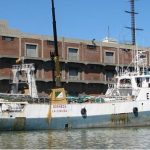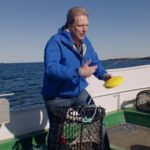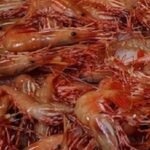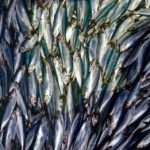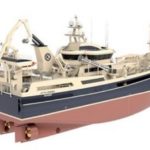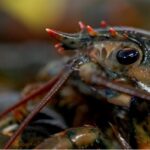Daily Archives: March 19, 2019
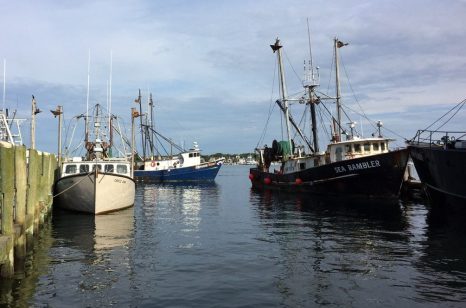
Gone squiddin’ in Galilee
Capt. Kevin Jones has been fishing out of the Port of Galilee, in southern Rhode Island, for a long time. “You know, I’m 63, and I started going when I was six years old,” he said. As a kid growing up near one of Rhode Island’s busiest ports, Jones helped out on other fishing boats as he worked his way up the ranks. Now, he’s captain of a 70-foot trawler. His primary catch, like most captains in Galilee, is squid. Longfin inshore squid, the species brought ashore at Galilee, is a point of pride in Rhode Island. The squid are processed and frozen at the port, and are shipped all across the country and the world for human consumption. >click to read<20:47
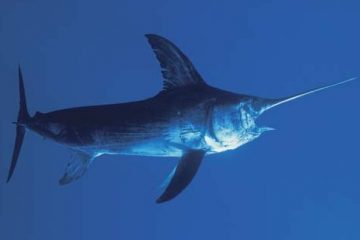
A California battle over swordfish — and gill nets
Conservationists are pushing a $1 million effort this summer to change the way swordfish are caught off the California coast by phasing out the use of gill nets. They are the mile-long nylon nets used to catch swordfish but that also ensnare other species, causing conservation organizations to seek an end to their use. Commercial fishermen can use gill nets now, with a drift gill net shark and swordfish permit from the Department of Fish and Wildlife. But a new California law will officially ban gill nets as of January 2023.,,, Organizations representing commercial fishermen opposed SB 1017 by state Sen. Ben Allen (D-Santa Monica), the bill that became the new law phasing out the use of gill nets. >click to read<17:08

Wednesday demonstration – FFAW has done worse damage to fisheries than harp seals or seismic blasting: FISH-NL
The Federation of Independent Sea Harvesters of Newfoundland and Labrador (FISH-NL) says the FFAW-Unifor has done worse damage to the province’s commercial fisheries than harp seals or seismic blasting. “Fishermen are nothing but a cash cow to the FFAW,” says Peter Leonard, Vice-President of FISH-NL and an inshore harvester from Southern Harbour. “The FFAW is working hand-in-hand with oil companies, the federal and provincial governments, and the aquaculture industry, and we’re being played for fools,” he added.,,, The FFAW-Unifor has scheduled a demonstration for noon Wednesday at the Delta Hotel in downtown St. John’s to “fight for the future of our fisheries.” >click to read<15:25

Fake lobster-tag case leads to arrests in Florida Keys
Florida fisheries investigators have made at least two arrests following a long inquiry into the sale of counterfeit lobster trap tags required by law for commercial anglers to do business in the state. The suspected ringleader is a Palmetto Bay woman who is the registered agent of more than 50 active and inactive commercial fishing operations in Florida. She was arrested Monday in the Florida Keys on racketeering and fraud charges. Elena P. Reyes, 67, is being held in Monroe County jail on a total bond of $892,500. Florida Fish and Wildlife Conservation Commission investigators also arrested Michael Enrique Sanchez,
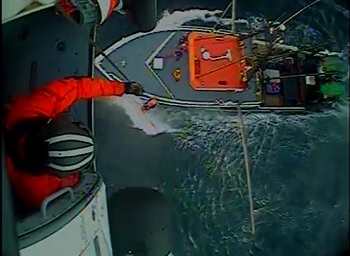
Coast Guard airlifts ailing fisherman 50 miles off Gloucester
An USCG Air Station Cape Cod MH-60 Jayhawk helipcopter crew medevaced an ill 40-year-old fisherman off the fishing boat America, Sunday, approximately 50 miles east of Gloucester. The man was transported to Massachusetts General Hospital for evaluation. >click for video<13:10

Lobster Boat Skipper Sentenced for Manslaughter
United States Attorney Halsey B. Frank announced that Christopher A. Hutchinson, 30, of Cushing, Maine was sentenced in U.S. District Court by Judge D. Brock Hornby to four years in prison and three years of supervised release for Seaman’s Manslaughter for causing the death of two crewmen who were then 26 and 15 years old. Hutchinson pleaded guilty on September 25, 2018. According to court records, on November 1, 2014, after smoking marijuana and drinking alcohol, Hutchinson took his lobster boat, the No Limits, out into a predicted storm with two crewmen aboard. After he had ingested oxycodone, the boat capsized. The two crewmen were not wearing personal floatation devices or survival suits. >click to read<11:44
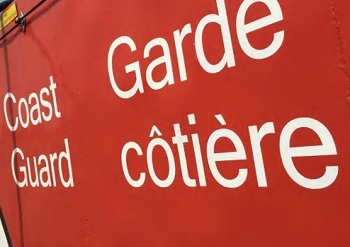
Fair Weather Fleet? How some coast guard ships stayed tied up when they could have been at work
There is more evidence suggesting Canadian coast guard mid-shore patrol vessels are a fair-weather fleet. Documents obtained by CBC News show that during a one-year period, two mid-shore patrol vessels based in Nova Scotia were tied up for 151 days in weather conditions when they were supposed to be operable. Last month, CBC revealed the Department of Fisheries and Oceans (DFO) is looking at installing stabilizers — blades that counteract the motion of waves — on its nine coast guard mid-shore vessels. This followed widespread complaints from crew about excessive rolling at sea. >click to read<10:20


































